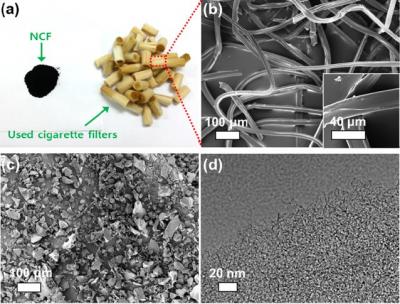Researchers from Seoul National University developed a one-step method to prepare a carbon material (which they call NCF) from used cigarette filters. They used the NCF to create supercapacitor electrodes - which exhibit a better rate capability and higher specific capacitance compared to conventional activated carbon. The capacitance is actually higher than N-doped graphene or N-doped CNT electrodes.

NCF is a nitrogen doped (N-doped) meso-/microporous hybrid carbon material. It is prepared via heating the filters in a nitrogen-containing atmosphere. The filters are made from mostly cellulose acetate fibers, which transform to mesopores and micropores which self-assemble into a unique pore structure.
In case you're wondering, by the way, cigarette butts are a major environmental issue. About 765,000 tons of cigarette butts are thrown every year in the US alone, and is responsible to almost 40% of roadway litter.
Only a few days ago we reported that hemp-based supercapacitor electrodes also outperform graphene-based electrodes. All these researchers are very interesting and hopefully we'll see some of these green ideas being commercialized.